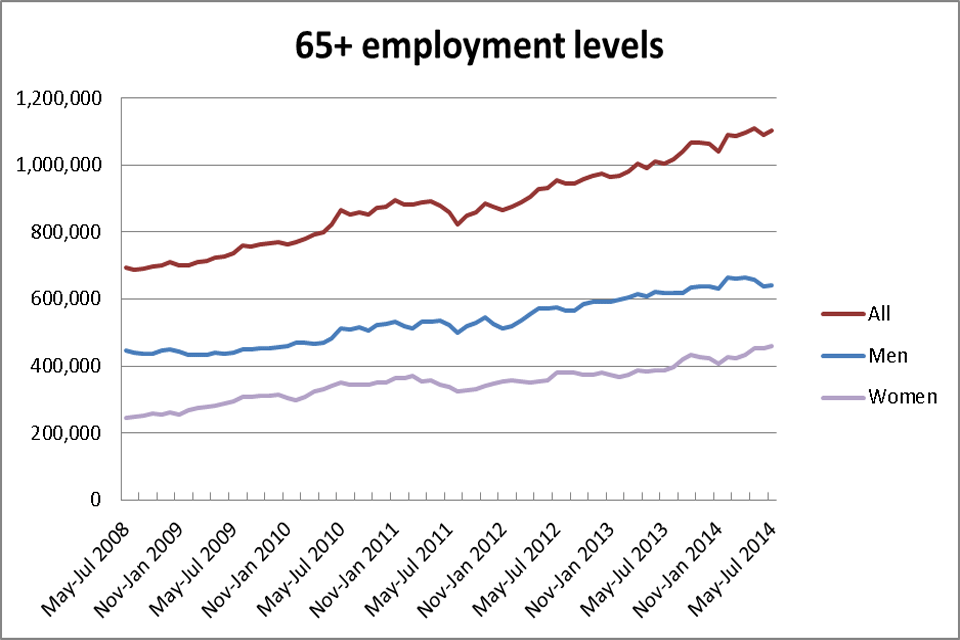Older People’s Day: 1 million in work over 65: 3 years since end of default retirement age
Three years on from an historic government move to outlaw enforced retirement, more than 1 million over 65s now choose to stay in work.

Department for Work and Pensions
The figures are revealed in a new DWP analysis released to mark International Older People’s Day (1 October).
Nearly a quarter of a million more people aged 65 and over have opted to stay in work since the default retirement age – a form of legal discrimination in the workplace – was abolished on 1 October 2011.
There are now 1,103,000 workers aged 65 and over in work compared to 874,000 in the quarter October to December 2011 – an increase of 229,000.

Employment levels for people aged 65 and over
Having the choice to work longer can open up significant financial opportunities for individuals and their families. An average earner working a year longer has the potential to boost their pension pot by around £4,500, in addition to earning an extra year’s salary.
There are also gains for the wider economy. Research shows if everyone chose to work 1 year longer, gross domestic product could increase by 1% – the equivalent of £16 billion in 2013.
Pensions Minister Steve Webb said:
In years to come, we’ll look back at the kind of age discrimination that the default retirement age represented and wonder how it was ever allowed. Forcing people to retire at 65 might have made sense in 1925 but, in the 21st century it was nothing short of an outrage.
We have to wake up to the needs and expectations of today’s workforce – 30% of whom are now aged over 50 and 1 million over 65. These people have a massive role to play in our economy and society and many quite rightly want to carry on using the skills and knowledge they have honed over decades and also pass them on to younger colleagues.
We are now supporting older workers further by extending the right to request flexible working and providing new pension freedoms so they can combine pension income with earnings, and therefore plan a gradual retirement.
Ros Altmann, the government Business Champion for Older Workers, said:
Older people are a huge resource for society and the whole economy. Indeed they have the potential to revitalise growth as more of them are working longer and staying active than ever before. There are currently well over 1 million people working beyond age 65.
Encouraging and enabling more later life working offers a massive potential financial boost both for individuals and the economy, as well as a more satisfying lifestyle for older generations and their families. Particularly facilitating a phase of part-time working to ease people into full retirement can bring significant benefits but that means overcoming ageism and unfair negative stereotyping of older workers.
It is also important to destroy the myth that older workers somehow take the place of younger ones.
The evidence is clear that helping older workers stay in the workplace is not only good for their own finances but also helps create more jobs for younger people too. As older generations have extra income and spending power for the short and longer term, this can boost the outlook for the whole economy and workers of all ages.
In October 2011 there were 526,000 men over 65 in work. There are now 643,000. And there are currently 460,000 women in work, compared to 348,000 in October 2011.
Many are driving an entrepreneurial boom helping boost the British economy, with over 400,000 people aged 65 plus now in self-employment according to Office for National Statistics data (April to June 2014).
Ewen MacLeod, director of A T Brown Coaches in Telford, Shropshire, employs 5 members of staff over the pension age. He said:
Our older workers are like gold-dust. Their experience and flexibility would be hard and costly to replace. At the same time we do also have a 16 year old apprentice mechanic who is shaping up well and is very keen.
It’s better for my business to keep our older workers, many working flexibly, than to recruit replacements. It’s all about long-term survival, even more so in the current climate.
Older workers facts
The latest Labour Force Survey data in September 2014 show that:
- the employment rate for 65 plus has increased since October 2011 (when the default retirement age was fully phased out) from 8.6% in October to December 2011 to 10.1% May to July 2014 – a 1.5 percentage point increase
- there were 1.1 million people aged 65 plus in employment in May to July 2014, an increase of 229,000 since October to December 2011
- there are more 65 plus women in work than ever before, at 460,000 women
- there are 9.1 million people aged 50 plus in work, 29.7% of all those in work aged 16 plus in the UK (30.6 million)
- the south east has the highest employment rates for 65 plus at 12.5% (Annual Population Survey, April 2013 to March 2014)
-
rates in other regions and nations stand at:
- east – 11.3%
- east Midlands – 8.6%
- London – 10.9%
- north east – 6.2%
- north west – 8.0%
- Northern Ireland 8.9%
- Scotland – 8.4%
- south east – 12.5%
- south west – 10.7%
- Wales – 9.1%
- West Midlands – 9.6%
- Yorkshire and the Humber – 7.6%
- the largest increase in 65 plus employment rates since April 2010 to March 2011 was in Northern Ireland (an increase of 2.9 percentage points)
Media enquiries for this press release – 020 3267 5123
Press Office
Caxton House
Tothill Street
London
SW1H 9NA
Telephone: 0115 965 8781
Follow DWP on:
- Twitter – www.twitter.com/dwppressoffice
- Facebook – www.facebook.com/dwp
- LinkedIn – www.linkedin.com/company/dwp
- YouTube – www.youtube.com/dwp